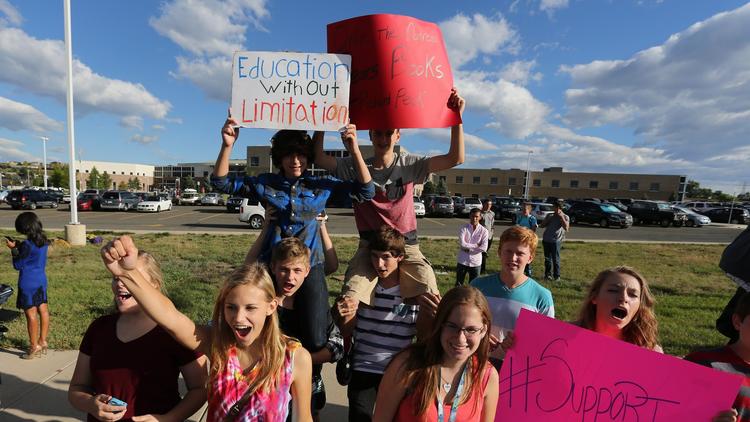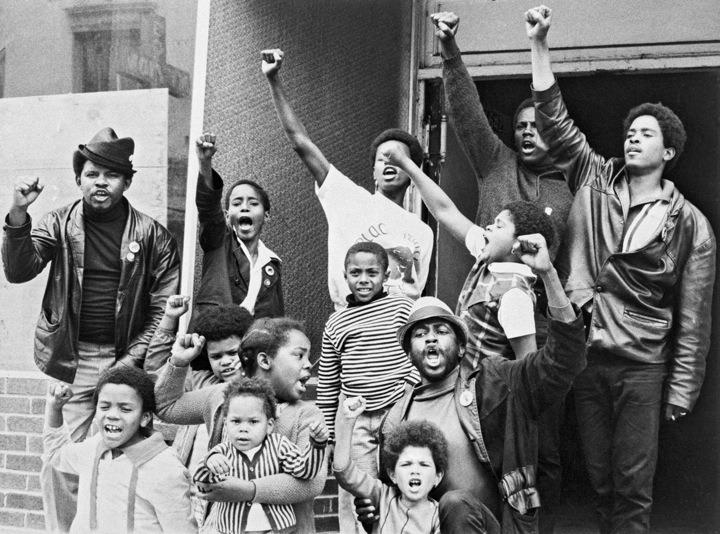Students in Colorado Protest Curriculum Change Proposal
October 3, 2014
“Don’t make history a mystery.” This was the emerging slogan of the hundreds of students in the Jefferson County School District in Colorado who walked out of their classes on Sept. 21 to protest the conservative school board’s proposed U.S. History curriculum change.
The proposal, spearheaded by one of the newly appointed board members, Julie Williams, seeks to “promote patriotic material, respect for authority, and the free-market system” and to avoid discussing “material about civil disorder, social strife or disregard of the law.”

Protesting students in Colorado viewed this proposal as an act of censorship on the part of the School Board. When interviewed about the subject, Lincoln student Kaitlin Poulain shared a similar view, noting that “it’s hard to paint a good picture of history when you’re only allowed to look at it through one perspective.” Indeed, it is rather apparent that the Jefferson County School Board seeks to take a glass-half-full approach to America’s history, but whether or not this is an act of censorship is up for debate.
In a statement made to the Los Angeles Times, Julie Williams expressed her surprise at the students’ dissent: “To be accused of censorship? Seriously? That is just ridiculous.” What Williams fails to realize is that, in the eyes of the protesting students, her proposal is, by definition, an act of censorship. Censorship is “the suppression of information which may be considered objectionable, harmful, sensitive, politically incorrect or inconvenient as determined by governments, media outlets, authorities or other such entities.” In this case, the protesters see that Jefferson County School Board is seeking to “suppress” the discussion of civil disobedience because it paints an “inconveniently” negative picture of the United States.
Though the proposal can justifiably be viewed as an act of censorship, realistically, its rather broad wording and Williams’s shocked reaction both indicate that it is not the School Board’s intent to censor. As Lincoln AP Government teacher Mr. Adas noted in an interview with Lion Tales, “the proposal is not censorship, but a mandate that will likely be tough to enforce.”

It would be easy to say that the School Board is a villainous group of adults seeking to subjugate students, but the situation is not so simple. Both the indignant protesters and the conservative school board members feel that they seek what is best for the students. The board is acting in accordance with the U.S.’s time honored tradition of instilling patriotism within its youth. They presumably do not want the students to be uneducated or uninformed; they simply want them to view their country with a sense of pride. Similarly, the protesters simply want to be given the chance to form opinions about their nation based on facts–all of the facts.
At the core of this disagreement, there lies one simple question: what constitutes “patriotic material”? Mr. Adas acknowledged the broad nature of this phrase, stating that “one could argue that the Black Panthers were ghetto patriots who fought blatant social inequality.” This seems rather contradictory given that the “civil disorder” that the Black Panthers incited is the very thing that the Jefferson County School Board seeks to suppress.
With regard to the current protests in Colorado, Kaitlin Poulain noted that “people feel that they are being patriotic when they go through these things. They’re trying to better their country.” The point that both Adas and Poulain are making can best be summed up by one of the Colorado protesters’ own slogans: “there is nothing more patriotic than protest.”
The events in Colorado stress the need for an open dialogue between the students and the School Board. If the Jefferson County School Board would listen to the protesting students, they would see that the acts of disobedience that they seek to avoid discussing are often times the greatest source of patriotism. A proposal similar to the one in Colorado could have easily been made in the San Jose Unified School District. The protests in Colorado are on their way to becoming a historical act of civil disobedience, and Lincoln students could stand to learn from them.
